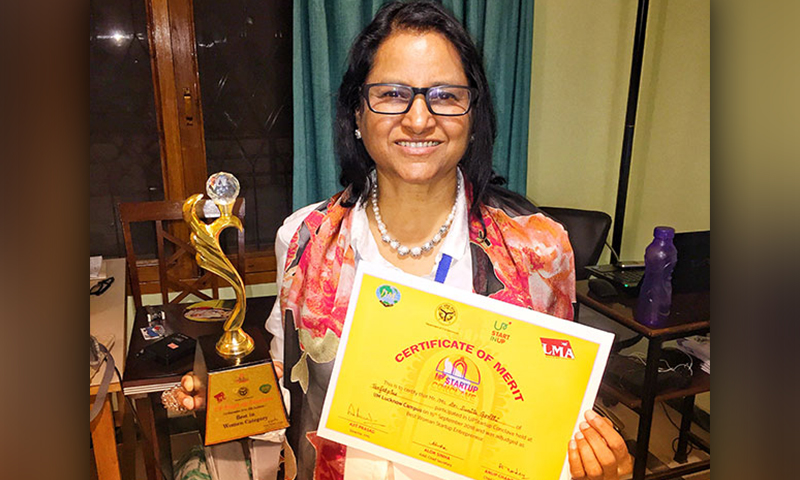A PhD holder from Cambridge University, UK, Dr. Sunita Gandhi is the founder of multiple institutions including Council for Global Education, USA, Global Education & Training Institute (GETI), DEVI Sansthan: Dignity, Education Vision International, India, and Education Society of Iceland. Her efforts in education have expanded a vast range, from the bottom up a grassroots level in Indian slums and villages through her NGO, to top-down policy work with the World Bank in Washington, DC, where she was selected as a Young Professional and completed a ten-year tenure as an Economist. In an email interaction with the Higher Education Digest, Dr. Sunita Gandhi elaborates on how GETI is helping schools during the COVID19 lockdown with digital transformations.
There has been an increase in the number of students pursuing online degrees in recent years. Do you think the COVID-19 pandemic will cause those numbers to grow?
Absolutely, the reason is people who are unaware of the online opportunities have been given a crash course knowingly as well as unknowingly. There is now a lot more awareness of online courses and a lot more people are getting on it, and they understand that it is very effective and less expensive. It will yield an excellent qualification. I believe and hope that more and more people will move to online education, as it is environment friendly and less expensive. In fact, there are a handful of universities like Denver University based out of the US, have started offering online courses and are also promoting online learning.
In India, how seriously are students going to be set back by not having formal instruction for at least two months, if not more? What are the efforts from GETI to control the damage?
To control the damage GETI is trying to get on board a lot more schools so they can provide online teaching to their students. GETI is offering basic 101 courses right from the start, and we train them on how to handle the technology, how to set up a timetable, even the kind of assignments that they can give to the students taking these online classes.
GETI is also providing textbooks to teachers as well as students that are very useful for homeschooling with a lot of self-learning components. These books are called TIER books, and they are bite-sized like the course of a year in a subject & is divided into six parts. So that makes it very concrete, like those who came within this month, they could try and give a one year of work.
These books are available in the format of e-books that envision every child can access. And teachers can do a lot of activities that are provided in it. These books have a proper timeline that allows better structure than just going through the chapters. We are offering a lot of support for their learning, and to a great extent, that learning is real.
The digital divide between students in India has become apparent as schools have increasingly turned to online instruction. What can school systems do to address that gap? How is GETI helping students with online education in Tier II and III cities?
Yes, I agree with the statement the digital divide has become very apparent. We have schools in rural areas which cater to children of farmers and vegetable vendors. We found that there is at least one smartphone per household, and they are aware of the fact that these online courses are the medium of learning, and that would be stuck for quite some time.
In the future, mobile would be a very potent mechanism to reach out to the children. So, yes, there is a divide, but the divide can be overcome, and it’s a necessity as we forge ahead.
The schools will have to embrace the challenge, one because it is going to become increasingly necessary. Secondly, because it is a powerful learning mechanism that they did not know earlier. We are increasingly finding that students with very meagre resources own one mobile device at least which is hopefully a smartphone so they can get WhatsApp for the connectivity and the possibility of online learning.
And in case there are no smartphones, the schools are now thinking to provide one. GETI is also helping in the sense of giving the opportunity to train the teachers and handling them and showing them how to create effective learning programs online and not just learning, but also assessments and assignments.

How did GETI anticipate the school closure in Indian and train teachers in the use of digital processes? How has been the response from schools after the lockdown?
So we did not anticipate it far in advance. We did get the idea though maybe a week before it all happened. And though we had trained our teachers on some platforms, for example, the Google classroom, the majority of the teachers even then were not very comfortable with it. So we’ve gotten some experts to train them immediately.
The response of schools after lockdown has been phenomenal. The teachers are highly engaged, which is a big surprise about all the difficulties that they’re having in this in the initial days that perhaps they will give up. And they have not.
And in fact, teachers have surprised us because they learned so many more ways. They learned Google Classroom and Google Hangout as well as WebEx by cisco. Then along the way, they learned about the fingerboards system that I brought in thinking this is good. So they have lapped so much, not just in terms of how they teach online and remotely, but in terms of the technology. So, we are all very delighted. The children have all the tools, and on all fronts, it’s going well.
What can parents do to help with the homeschooling of their children in the current crisis?
Currently, all over the world, parents are homeschooling their children, be it with the help of the Internet or without it. But with the technology, the parents have had to play a critical and collaborative role, especially for younger children. We have asked the parents to make a video of the children’s activities, and they’ve done it. They have also engaged them in Hands-On activities at home, sorting, and helping them and chores around the house. For now, we will advise parents to put less stress on their children and help them in evolving their skills. Through homeschooling, children can not only learn academically but also values like helping their parents, listening to them and respecting the elders.
Are there concerns about the negative effects of increased screen time, especially on younger children, as we move education online?
Yes, there are some negative effects, and that’s why GETI has provided teachers with bite-size screen times.
There is a lot more screen time than it was in the past, but if children did not go onscreen to learn, they would do other things, and that’s even worse. So we can say that at least they’re now going online for a mix of reasons, not just playing games. It’s a question similar to what you have in a matchbox.
It has its benefits, but then it has some hazards. The only solution is that parents have to manage the screen time as there is no other way. The balance has to be made, and parents can cut television and video games time.
What is your advice to students and teachers?
For the teachers, I would like to say that technology is here to stay, so continue with it and don’t give it up when the schools reopen because it’s a powerful mechanism that allows a different possibility for learning. For the students, I would like to advise that this is an opportunity to pick up on masterstroke technology as it’s a very efficient way to learn and for you to get feedback about your learning. So adapt it, learn as much as you can during this period, do some extracurricular activities and help your parents in chores around the house.




